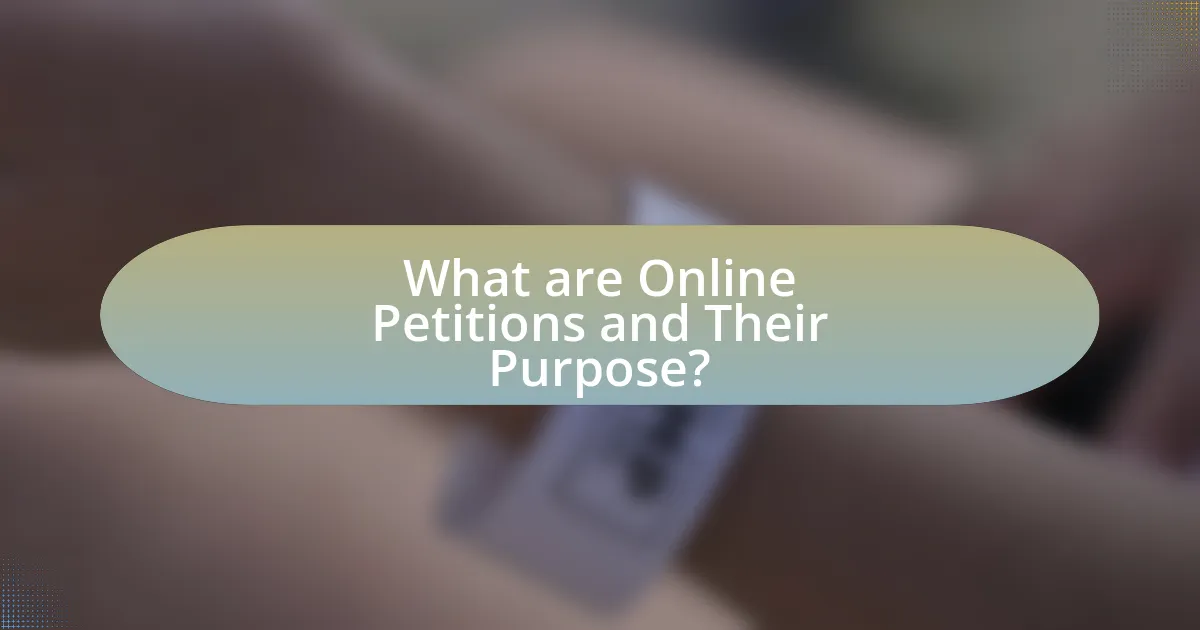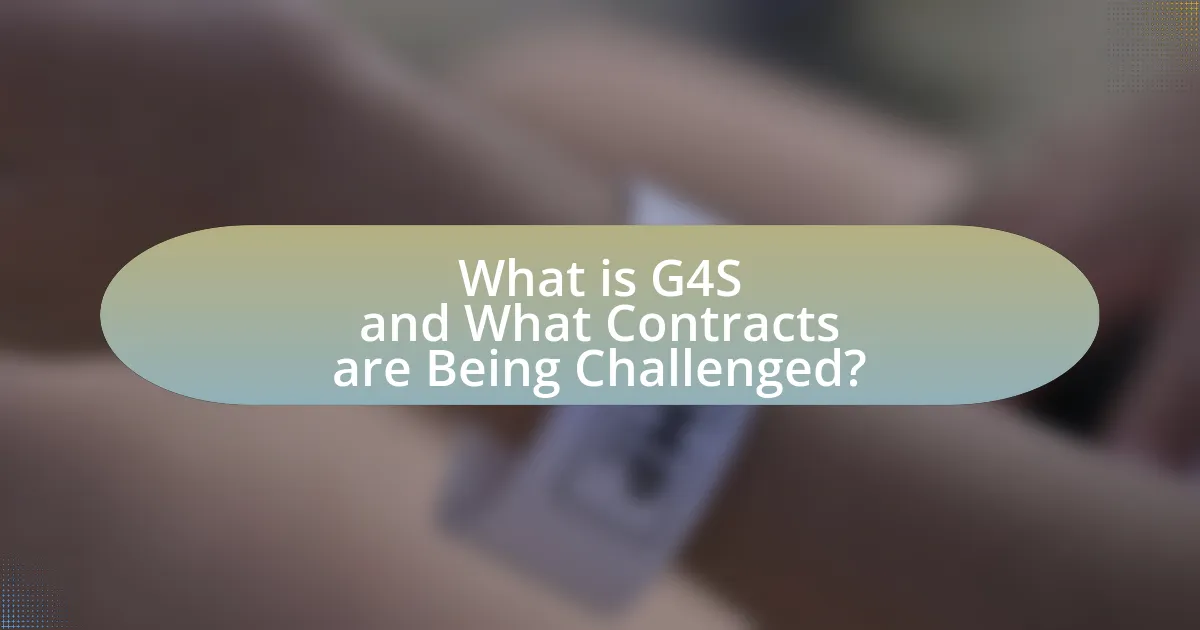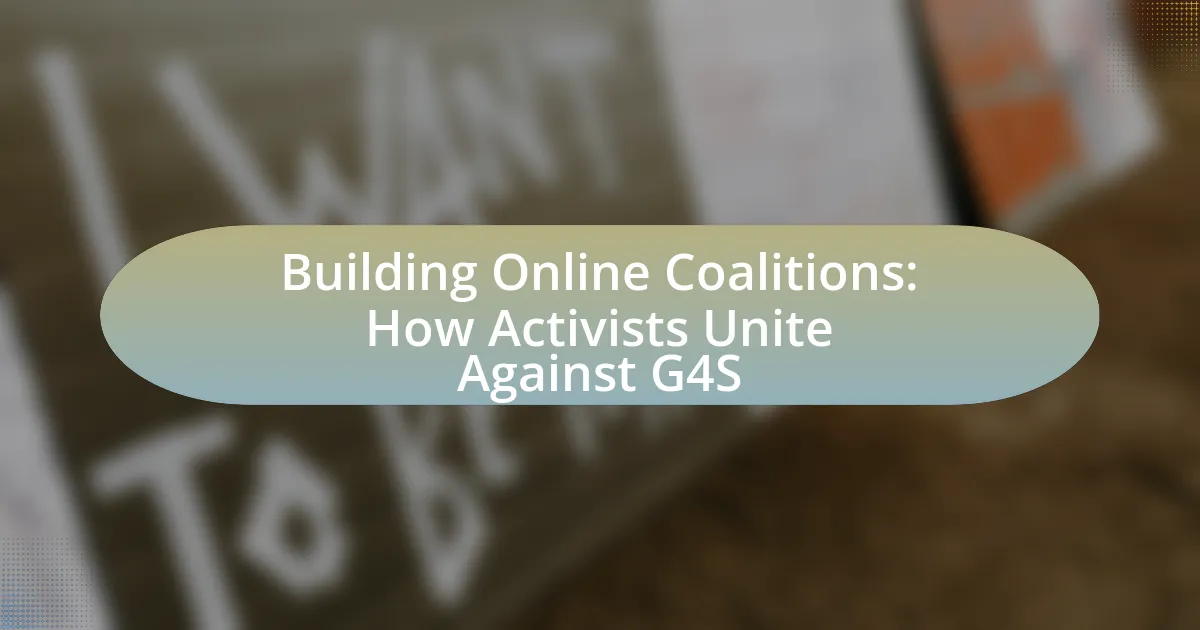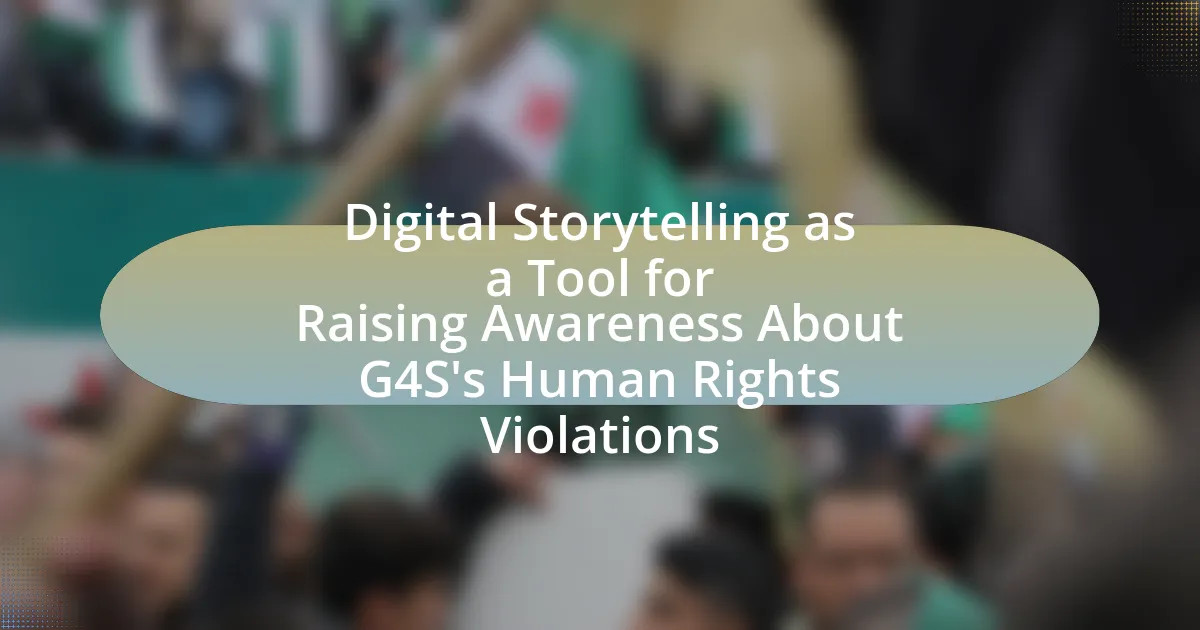Online petitions are digital tools that enable individuals to gather support for specific causes by collecting signatures, primarily aimed at mobilizing public opinion and influencing decision-makers. This article examines the effectiveness of online petitions in challenging contracts held by G4S, a global security company facing scrutiny for alleged human rights violations. It discusses how these petitions function in the digital age, the platforms commonly used, and their significance in social movements. Additionally, the article explores the challenges faced by online petitions, metrics for measuring their effectiveness, and best practices for creating impactful campaigns against G4S contracts.

What are Online Petitions and Their Purpose?
Online petitions are digital tools that allow individuals to gather support for a specific cause or request by collecting signatures from people who agree with the petition’s objectives. Their primary purpose is to mobilize public opinion, raise awareness about issues, and influence decision-makers or organizations to take action. For instance, online petitions have been effectively used to challenge corporate contracts, such as those held by G4S, by demonstrating widespread public support for changes in policy or practice. This method of advocacy leverages the internet’s reach to amplify voices and create pressure for accountability.
How do online petitions function in the digital age?
Online petitions function in the digital age by leveraging internet platforms to gather signatures and mobilize support for various causes. These petitions utilize social media, email, and dedicated websites to reach a broad audience quickly, allowing individuals to express their opinions and advocate for change efficiently. For instance, platforms like Change.org and Care2 enable users to create petitions that can be shared widely, often resulting in thousands of signatures within a short period. This rapid dissemination of information and the ability to engage supporters in real-time enhance the visibility and impact of the petitions, making them a powerful tool for social and political activism.
What platforms are commonly used for online petitions?
Commonly used platforms for online petitions include Change.org, Care2, and Petition.org. Change.org is one of the largest petition platforms globally, with millions of users and a wide range of topics. Care2 focuses on social and environmental issues, providing a community for activists. Petition.org allows users to create and share petitions easily, contributing to various causes. These platforms have been instrumental in mobilizing public support and influencing decision-makers, demonstrating their effectiveness in advocacy efforts.
How do these platforms facilitate user engagement?
Online petition platforms facilitate user engagement by providing accessible tools for individuals to express their opinions and mobilize support for causes. These platforms enable users to create, sign, and share petitions easily, fostering a sense of community and collective action. For instance, platforms like Change.org report millions of users participating in petitions, demonstrating high levels of engagement. Additionally, features such as social media integration and real-time updates on petition progress enhance user interaction and encourage sharing, further amplifying the reach and impact of the petitions.
Why are online petitions significant in social movements?
Online petitions are significant in social movements because they facilitate widespread mobilization and engagement around specific issues. They allow individuals to express their support or opposition to a cause quickly and efficiently, often reaching a global audience. For instance, the online petition platform Change.org has hosted petitions that garnered millions of signatures, demonstrating the potential for collective action to influence policy decisions and corporate practices. This ability to rapidly gather support can pressure decision-makers, as seen in campaigns against companies like G4S, where public sentiment expressed through petitions has led to increased scrutiny and calls for accountability.
What role do they play in raising awareness?
Online petitions play a crucial role in raising awareness about issues related to G4S contracts by mobilizing public support and disseminating information. They serve as platforms for individuals to express their concerns, share personal stories, and highlight the implications of G4S’s practices, thereby increasing visibility on topics such as human rights violations and corporate accountability. Research indicates that online petitions can significantly amplify public discourse, as evidenced by the success of campaigns that have garnered thousands of signatures, leading to media coverage and political pressure. For instance, a study by the University of California found that petitions with over 100,000 signatures are more likely to receive a response from policymakers, demonstrating their effectiveness in raising awareness and prompting action.
How can they influence public opinion and policy?
Online petitions can influence public opinion and policy by mobilizing collective action and raising awareness about specific issues. They serve as a platform for individuals to express their concerns, which can lead to increased media coverage and public discourse. For instance, a study by the Pew Research Center found that 70% of Americans believe that online activism can lead to real-world change, demonstrating the potential impact of digital petitions on shaping societal views and prompting policymakers to respond to public demands.

What is G4S and What Contracts are Being Challenged?
G4S is a global security company that provides a range of services including security personnel, technology solutions, and risk management. Currently, contracts being challenged involve G4S’s provision of security services for various public sector entities, particularly in the UK, where concerns have been raised regarding the company’s handling of detainee welfare and allegations of human rights violations. These challenges are often driven by public campaigns and online petitions aimed at increasing accountability and transparency in G4S’s operations.
What services does G4S provide that are under scrutiny?
G4S provides security services, including prison management, immigration detention, and cash handling, which are under scrutiny. These services have faced criticism due to allegations of human rights abuses, inadequate care in detention facilities, and concerns over the treatment of individuals in their custody. Reports from organizations such as Amnesty International and Human Rights Watch have highlighted these issues, raising questions about the ethical implications of G4S’s operations in sensitive areas.
How do these services impact communities?
Online petitions significantly impact communities by mobilizing collective action and raising awareness about issues related to G4S contracts. These services enable individuals to voice their concerns, fostering community engagement and solidarity. For instance, a study by the University of California found that online petitions can lead to increased public discourse and pressure on decision-makers, resulting in policy changes or contract reviews. This demonstrates that online petitions serve as a powerful tool for communities to influence corporate practices and advocate for social justice.
What controversies have arisen from G4S contracts?
Controversies surrounding G4S contracts primarily involve allegations of human rights abuses, inadequate training of personnel, and involvement in controversial government contracts. For instance, G4S has faced criticism for its role in the management of immigration detention centers, where reports of mistreatment and poor conditions have emerged. Additionally, the company has been scrutinized for its security operations in conflict zones, raising ethical concerns about its practices. These controversies have led to public outcry and online petitions aimed at challenging and terminating G4S contracts, reflecting widespread discontent with the company’s operations and accountability.
Why are G4S contracts a target for online petitions?
G4S contracts are a target for online petitions primarily due to the company’s involvement in controversial practices, including allegations of human rights abuses and inadequate service delivery. These issues have led various advocacy groups and individuals to mobilize public opinion against G4S, seeking to hold the company accountable and push for contract cancellations. For instance, G4S has faced scrutiny for its role in immigration detention centers, where reports of mistreatment have emerged, prompting petitions that demand the termination of contracts with governmental bodies. The combination of public concern over ethical practices and the power of collective online action makes G4S contracts a focal point for petitions aimed at reform and accountability.
What specific issues are petitioners addressing?
Petitioners are addressing concerns related to the ethical implications of G4S contracts, including human rights violations and inadequate labor practices. These issues stem from allegations that G4S has been involved in controversial activities, such as operating in conflict zones and managing detention facilities with reported abuses. The petitioners aim to raise awareness and prompt action against these practices, advocating for accountability and reform in G4S’s operations.
How do these issues resonate with the public?
The issues surrounding G4S contracts resonate with the public primarily due to widespread concerns about human rights and ethical practices in security services. Public sentiment is increasingly influenced by reports of G4S’s involvement in controversial activities, such as allegations of mistreatment in detention centers, which have sparked outrage and calls for accountability. A survey conducted by Amnesty International revealed that 70% of respondents expressed concern over the ethical implications of companies like G4S operating in sensitive environments. This heightened awareness drives individuals to engage in online petitions, reflecting a collective demand for transparency and reform in corporate practices.

How Effective are Online Petitions in Challenging G4S Contracts?
Online petitions have shown varying degrees of effectiveness in challenging G4S contracts, primarily depending on public engagement and media coverage. For instance, significant campaigns, such as those against G4S’s involvement in controversial projects, have garnered thousands of signatures, leading to increased scrutiny from stakeholders and sometimes resulting in contract reviews or cancellations. A notable example is the petition against G4S’s role in the Israeli-Palestinian conflict, which attracted widespread attention and influenced public discourse, prompting some institutions to reconsider their contracts with the company. This demonstrates that while online petitions can mobilize public opinion and pressure decision-makers, their success often hinges on the broader context and the level of public support they can generate.
What metrics can be used to measure the effectiveness of online petitions?
Metrics to measure the effectiveness of online petitions include the number of signatures collected, the rate of signature growth over time, engagement levels on social media platforms, and the response from targeted decision-makers or organizations. The number of signatures indicates public support, while the growth rate reflects the petition’s momentum. Engagement metrics, such as shares, comments, and likes on social media, demonstrate the petition’s reach and influence. Additionally, tracking responses from decision-makers, such as public statements or actions taken in response to the petition, provides direct evidence of its impact. These metrics collectively offer a comprehensive view of an online petition’s effectiveness in mobilizing support and prompting action.
How do signatures translate into real-world impact?
Signatures translate into real-world impact by demonstrating public support for a cause, which can influence decision-makers and drive policy changes. For instance, a significant number of signatures on an online petition can compel organizations or governments to reconsider contracts or practices, as seen in campaigns against G4S contracts where petitions garnered thousands of signatures, leading to increased scrutiny and, in some cases, contract termination. This correlation between signatures and tangible outcomes is supported by research indicating that petitions with higher signature counts are more likely to receive media attention and prompt responses from targeted entities.
What case studies illustrate successful challenges to G4S contracts?
Successful challenges to G4S contracts are illustrated by the case of the University of California, which ended its contract with G4S after student-led online petitions highlighted concerns over the company’s human rights record and treatment of workers. Another example is the campaign by the UK-based organization, “No to G4S,” which successfully pressured several local councils to terminate their contracts with G4S due to its involvement in controversial immigration detention practices. These case studies demonstrate the effectiveness of online petitions in mobilizing public opinion and influencing institutional decisions regarding G4S contracts.
What challenges do online petitions face in influencing G4S contracts?
Online petitions face significant challenges in influencing G4S contracts due to the company’s established relationships with government entities and the complexity of procurement processes. G4S, as a major security provider, often operates under long-term contracts that are difficult to alter or terminate based on public sentiment. Additionally, the effectiveness of online petitions is often limited by low visibility and engagement, as many petitions fail to reach a critical mass of support needed to prompt action from decision-makers. Furthermore, G4S may not prioritize public opinion in its contractual agreements, focusing instead on compliance with legal and regulatory frameworks. These factors collectively hinder the potential impact of online petitions on G4S’s contractual obligations.
How do legal and political barriers affect petition outcomes?
Legal and political barriers significantly hinder petition outcomes by limiting the ability of petitioners to influence decision-makers and navigate regulatory frameworks. For instance, stringent legal requirements can restrict the types of petitions that can be filed, while political opposition may lead to a lack of support from key stakeholders, reducing the likelihood of successful outcomes. Historical examples, such as the challenges faced by activists in the UK when petitioning against government contracts with private security firms, illustrate how these barriers can stifle public dissent and limit the effectiveness of grassroots movements.
What strategies can enhance the effectiveness of these petitions?
To enhance the effectiveness of online petitions challenging G4S contracts, mobilizing a large and engaged audience is crucial. Strategies include leveraging social media platforms to amplify reach, as studies show that petitions shared on social media can increase signatures by up to 200%. Additionally, targeting specific stakeholders, such as local government officials or community leaders, can create pressure for action. Crafting a clear and compelling narrative that outlines the issues and desired outcomes also significantly boosts engagement, as emotionally resonant messages are more likely to be shared. Furthermore, setting a specific deadline for signatures can create urgency, motivating individuals to act promptly.
What best practices should be followed when creating online petitions against G4S?
To create effective online petitions against G4S, it is essential to clearly define the specific issue being addressed, ensuring that the petition’s purpose resonates with potential supporters. Engaging storytelling that highlights personal experiences or factual evidence related to G4S’s practices can significantly enhance emotional appeal and drive participation. Additionally, setting a realistic and measurable goal, such as a specific number of signatures, helps to create a sense of urgency and purpose.
Promoting the petition through social media platforms and relevant community groups increases visibility and encourages sharing, which can amplify reach. Collaborating with established organizations that align with the cause can lend credibility and attract a broader audience. Lastly, regularly updating supporters on the petition’s progress and next steps fosters a sense of community and keeps the momentum going.
These practices are supported by research indicating that well-structured petitions with clear goals and strong narratives tend to garner more support and achieve greater impact.
How can petition creators effectively engage their audience?
Petition creators can effectively engage their audience by utilizing clear messaging, emotional appeals, and targeted outreach strategies. Clear messaging ensures that the purpose of the petition is easily understood, which is crucial for attracting support; studies show that concise and direct communication increases engagement rates. Emotional appeals, such as personal stories or impactful statistics, can resonate with potential signers, making them more likely to participate; for instance, petitions that highlight personal experiences related to the issue often see higher signature counts. Targeted outreach strategies, including leveraging social media platforms and community networks, can significantly expand the petition’s reach; research indicates that petitions shared on social media can gain up to 10 times more signatures than those that are not.
What are common pitfalls to avoid in online petition campaigns?
Common pitfalls to avoid in online petition campaigns include lack of clarity in the petition’s purpose, insufficient outreach, and failure to engage supporters effectively. A clear and concise message is essential; petitions that are vague or overly complex tend to confuse potential signers, leading to lower participation rates. Research indicates that campaigns with targeted outreach strategies, such as leveraging social media and community networks, achieve higher engagement levels. Additionally, maintaining ongoing communication with supporters through updates and calls to action is crucial; campaigns that neglect this aspect often see a decline in momentum and support.





